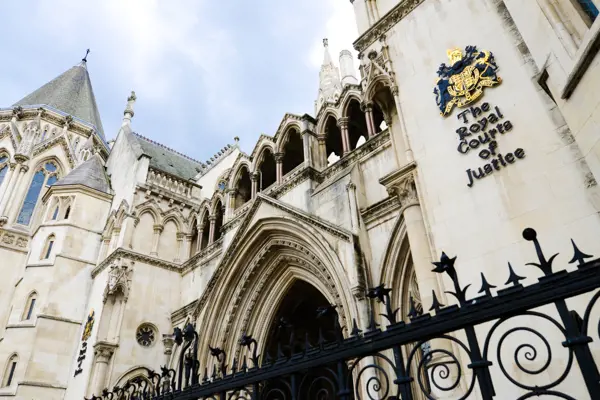
High Court finds MoD breached the Geneva Conventions during the Iraq War
A High Court judge today ruled the MoD unlawfully detained civilians during the Iraq war, breaching the Human Rights Act and the Geneva Conventions
Posted on 14 December 2017
A High Court judge has today ruled that the Ministry of Defence (MoD) implemented a flawed and unlawful approach to the detention of civilians during the Iraq war, breaching not only the Human Rights Act but also the Geneva Conventions.
Mr Justice Leggatt also ruled that British soldiers subjected Iraqi civilians to inhuman and degrading treatment which included soldiers taking turns running over the backs of detained civilians and hooding them for periods of time.
Today’s judgment follows the first two High Court civil trials which heard allegations of abuse and unlawful detention in relation to four Iraqi civilians who gave evidence in an English courtroom for the first time.
The four ‘lead’ cases in the judgment were chosen from a total of over 600 which remain unresolved following the war in Iraq.
In his judgment Justice Leggatt made clear that “none of the claimants was engaged in terrorist activities or posed any threat to the security of Iraq”. [para 929]
Sapna Malik, a partner in the international claims team at Leigh Day who represented two of the claimants, said:
“These trials took place against an onslaught of political, military and media slurs of Iraqis bringing spurious claims, and strident criticism of us, as lawyers, representing them.
“Yet we have just witnessed the rule of law in action. Our clients are grateful that the judge approached their claims without any preconception or presumption that allegations of misconduct by British soldiers are inherently unlikely to be true.
“Our clients’ evidence has been tested at length in court and the Ministry of Defence has been found wanting.
“It is vital that those wronged by the UK Government, whether in this country or overseas, are able to seek justice and redress. Their ability to do so in our courts is not a witch hunt but a testament to the strength of our democracy.”
Shubhaa Srinivasan, a partner in the international claims team at Leigh Day who represented MRE and KSU, said:
“This judgment is a testament to why justice should be allowed to take its course. Our clients welcome the judge’s findings that recognises their fundamental rights have been breached by the Ministry of Defence and this deserves due recognition under the law by way of awarding damages as an effective remedy.
“The judge arrived at this decision after extensive and impartial scrutiny of the evidence in two separate trials. The decision sends a clear message that no one, including the British Government should be above the law”
In total, Leigh Day has issued 967 claims on behalf of Iraqi citizens against the MoD alleging unlawful detention/ mistreatment and in some cases, including Baha Mousa, unlawful killings.
Of these four have been discontinued or struck out and 331 have been settled by the MoD.
The judgment published today in these four ‘lead’ cases should allow for the MoD and Leigh Day to assess the merits of the remaining 628 cases.
The third group of cases is due to be heard at a trial next year as the allegations involve UK joint liability with US forces and therefore the Court will hear separate legal arguments in relation to these cases.
Background
The trials collectively lasted over two months and heard evidence from over 50 MoD witnesses and the four Iraqi claimants, their cases are summarised below:
Kamil Alseran
The first of the two civil trials took place in June and July 2016, it was originally going to involve three claims arising from different phases of the Iraq conflict, but one of them was settled with the MoD shortly before the trial began.
At this first trial both Kamil Alseran and Abd Ali Hameed Ali Al-Waheed gave oral evidence. Kamil Alseran, was a 22-year-old Iraqi civilian when he was captured in his home at the end of March 2003 as British Forces advanced on Basra.
Whilst he was interned at a temporary camp at Al-Seeba, he and other prisoners were made to lie face down on the ground by British soldiers who then took it in turns to run over the prisoners’ backs, using them as stepping stones, as they ran along the line of prisoners in heavy military boots.
According to Mr Alseran and other supporting witnesses, the soldiers were laughing and some were taking pictures as this occurred.
Mr Justice Leggatt said: “In the present case the context of Mr Alseran’s capture and detention was a war. That context cannot excuse cruelty or brutality but account needs to be taken of the acute stress and constant danger under which soldiers are operating in combat conditions.” [Para 232] “…the incident at Al-Seeba in which soldiers deliberately ran over the backs of prisoners clearly crossed the threshold level of severity to amount to a breach of article 3. Those assaults involved the gratuitous infliction of pain and humiliation for the amusement of those who perpetrated them. They have caused Mr Alseran deep and long-lasting feelings of anger and mental anguish and were an affront to his dignity as a human being. I find that they constituted both inhuman and degrading treatment. They also constituted a clear breach of the Geneva Conventions, which require prisoners at all times to be humanely treated: see article 13 of Geneva III and article 27 of Geneva IV.” [Para 233]
Following this abuse, Mr Alseran was taken to a prisoner of war internment facility, Camp Bucca, where he was unlawfully detained from 10 April 2003 until his release on 7 May 2003. The judge described the system adopted at the Camp to detain civilians as ‘flawed’ and in violation of article 5 of the European Convention on Human Rights and the Geneva Conventions.
Mr Justice Leggatt states in today’s judgment: “The system for review of detention at Camp Bucca was flawed because the approach adopted was to treat an individual who claimed to be a civilian (such as Mr Alseran) as a prisoner of war unless there was no doubt that the person was a civilian. That approach was based on a wrong understanding by the MOD of the Geneva Conventions. The correct approach would have been to consider whether there was evidence that the individual claiming civilian status was a combatant or had taken part in hostilities. If – as in Mr Alseran’s case – there was no such evidence, then there was no power to intern him, whether as a prisoner of war or as a civilian internee. Had the correct test been applied, Mr Alseran should and probably would have been released by 10 April 2003.” [Para 9v]
Mr Alseran was awarded £12,500 for the ill treatment following his capture at Al-Seeba and his unlawful detention whilst at Camp Bucca.
Abd Ali Hameed Ali Al-Waheed
Mr Al-Waheed was arrested in a house raid carried out by British soldiers in Basra city on the night in February 2007.
He was 53 years old at the time and had recently remarried. The soldiers were looking for his brother-in-law who was suspected of involvement in terrorist activities.
Mr Justice Leggatt found that Mr Al-Waheed’s allegations of mistreatment were greatly exaggerated, noting that his ‘psychiatric condition and exaggerated perception of pain’ had ‘coloured his memories of the past’ [Para 620].
However, the judge found that “the injuries to Mr Al-Waheed’s head, upper body and right hand recorded in his medical notes were deliberately inflicted by the soldiers who travelled with him to the Basra Airport base and that during that journey Mr Al-Waheed was systematically beaten with one or more implements (probably rifle butts) and was punched in the face.” [para 654]
His injuries were so severe on arrival at Basra Airport that a military doctor who examined him referred the matter to the Royal Military Police as he was so concerned about his injuries and how he had sustained them.
In addition to this assault, Mr Justice Leggatt found that Mr Al-Waheed, an Iraqi civilian, had been subjected to inhuman and degrading treatment including sleep deprivation, “harsh” interrogation involving a deliberate attempt to humiliate the detainee, by insulting and shouting personal abuse at them, and periods of complete deprivation of sight and hearing.
According to the judge Mr Al Waheed’s evidence in relation to how the questioning was conducted was not challenged by the MoD and was consistent with descriptions of the “harsh” interrogation technique which was permitted by the MoD at that time but which has since been banned by the British Army and which the judge held violated article 3 of the European Convention on Human Rights [para 676].
The judge found that “the practice of depriving detainees of both sight and hearing was inconsistent with the MOD’s published doctrine.” Further that he was “driven to conclude that the reason why the practice was adopted was that suggested by the Provost Martial (Army) in his reports written at the time: namely, that it was done as a form of deliberate ‘conditioning’, in order to maximise vulnerability and the ‘shock of capture’. It also seems to me that a practice which prevented detainees who were already defenceless from being able to see (or hear) exactly what was being done to them or by whom was not only calculated to make the detainees feel more vulnerable but also – by dehumanising them and giving their captors a cloak of invisibility – to increase the risk of physical abuse.” [para 665]
The judge observed how initial reports regarding the circumstances of Mr Al-Waheed’s capture were ‘pure fiction’ [para 590].
Further, that despite an MoD review committee deciding on 22 February 2007 that Mr Al-Waheed had no connection with his brother-in-law’s activities and did not pose a threat to security and that he should be released, he was not let go until 28 March 2007 a period of 33 days which Mr Justice Leggatt ruled as a violation of article 5 of the European Convention on Human Rights.
Mr Justice Leggatt awarded Mr Al Waheed a total of £33,000 for the beating which he suffered after his arrest, the inhuman and degrading treatment he was subjected to and unlawful detention at Shaibah detention facility.
MRE and KSU
The second trial which heard the claims of MRE and KSU took place in March and April 2017 at which the two men gave oral evidence.
The MOD provided evidence from 34 factual witnesses. Between them, the parties relied on evidence from 14 medical experts in eight different specialisms.
MRE and KSU were Iraqi citizens who, when the war began, were serving on a merchant ship which was moored in the Khawr az Zubayr waterway north of Umm Qasr. Due to the sexual nature of the assaults on the men, they have been granted anonymity.
MRE was 37 years old and was employed as an engineer on the ship. KSU was 27 years old and was employed as a guard.
Their ship was boarded on 24 March 2003 by coalition forces and four crew members, including MRE and KSU, were captured. They were transferred to a large warship on which they were held overnight.
On arrival onto this ship they were forced to strip naked and subjected to an intrusive physical inspection which involved sexual humiliation. KSU was also burnt on the buttock with a lit cigarette.
Although the Court found that MRE’s and KSU’s allegations of sexual assault and humiliation were substantially true, the judge concluded that he was unable to determine whether the perpetrators of this abuse on the warship were British or American soldiers.
The following morning MRE and KSU were taken back by boat to Umm Qasr port to be transported to Camp Bucca.
The Court was clear that from the time MRE and KSU disembarked at Umm Qasr port, on the day after their capture, until their release from Camp Bucca, which occurred on 10 April 2003, the two men were in the custody of British forces, and suffered mistreatment during this period.
For the duration of the journey from the port to Camp Bucca the Claimants were hooded with sandbags, The Court found this was inhuman and degrading treatment which violated article 3 of the European Convention on Human Rights as well as amounting to an assault.
On hooding, the judge said: “I consider that the court should now make it clear in unequivocal terms that putting sandbags (or other hoods) over the heads of prisoners at any time and for whatever purpose is a form of degrading treatment which insults human dignity and violates article 3 of the European Convention. It is also, in the context of an international armed conflict, a violation of article 13 of Geneva III, which requires prisoners to be humanely treated at all times.” [Para 495]
The judge accepted the evidence of MRE that he suffered fear and anxiety from having his head completely covered with a bag. He also accepted the evidence of KSU: “that having a sandbag put over his head and then being forced to the ground and made to shuffle forwards on his knees before being shoved and kicked into a vehicle caused him to feel terrified and humiliated. He said in his evidence: “I could not understand why they would do such a thing to another human being. They were treating me like I was an animal.” It is difficult to disagree with that description.” [para 498]
A piece of glass within the sandbag penetrated MRE’s eye whilst he was hooded and caused damage to his vision.
MRE was struck on the head on the dock at Umm Qasr and later kicked in the knee by a British soldier while detained at Camp Bucca.
The Court agreed that both assaults were proven. The blow to the head constituted inhuman treatment which violated article 3 of the European Convention.
On their detention at Camp Bucca, Justice Leggatt said: “The claimants were entitled under international humanitarian law and article 5 of the European Convention to have their cases assessed and a decision whether to intern or release them made promptly following their arrival at Camp Bucca on 25 March 2003. Making all due allowance for the wartime conditions, such an assessment should have taken place within, at most, ten days of their internment. Their cases were not considered, however, until 10 April 2003 – when the decision was made to release them. In the result, they were unlawfully detained for six days. Their detention during this period violated article 5 of the European Convention and also gave rise to a claim in tort (as the British government did not authorise detention which was in breach of international humanitarian law and the Human Rights Act).” [para 13 vi]
Both men were awarded £10,000 for the hooding, for his eye injury as a result of the hooding MRE was awarded an additional £1,000, a further £15,000 for the blow to his head and £1,440 for associated cost of medical treatment. For the six days of unlawful imprisonment, both men were each awarded damages of £600.

